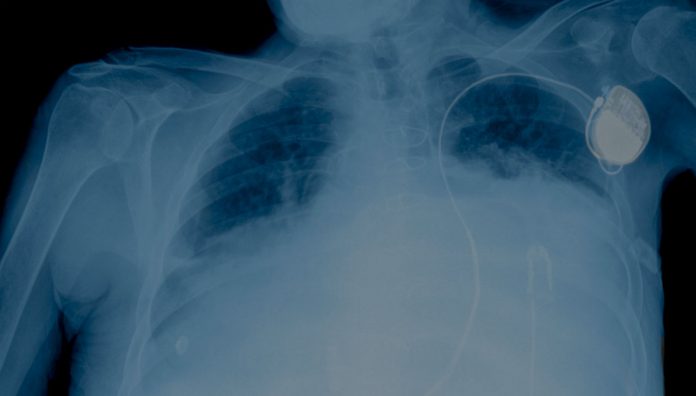The effectiveness of systemic corticosteroids for the management of dyspnoea in adults with advanced cancer.
Dyspnoea affects almost 70% of advanced cancer patients at the end of life.1 It is often associated with fatigue, insomnia, anxiety, depression and reduced quality of life.2 This evidence summary presents the best available evidence regarding the effectiveness of systemic corticosteroids for the management of dyspnoea with advanced cancer. For the full review, refer to Systemic corticosteroids for the management of cancer-related breathlessness (dyspnoea) in adults.3
Background
The management of dyspnoea in patients with advanced cancer is much harder than patients who experience pain. This is because the causes of dyspnoea in the palliative care setting are often multifactorial. Causes of dyspnoea in advanced cancer include progressive metastatic disease, lymphangitis carcinomatosa, pleuritis carcinomatosa, pleural effusion, interstitial lung disease, parenchymal lung involvement, pulmonary embolism, infection, atelectasis, airway obstruction and pre-existing pulmonary disease.2
Other systemic causes of dyspnoea include anaemia, hypoxaemia, uraemia or acidaemia, congestive cardiac failure, pericarditis or pericardial effusion, pulmonary hypertension, sepsis, cardiovascular/physical deconditioning, muscle weakness or neuro-muscular conditions.2 Therefore, assessment of causes of dyspnoea is important to aid in finding an appropriate management.
Management of dyspnoea includes avoiding trigger factors as well as managing the underlying causes such as depression, anxiety and carer’s stress. Non-pharmacological management includes breathing exercises, education and behavioural strategies.4 Pharmacological treatment includes opioids and benzodiazepines.5 Systemic corticosteroids are used for conditions such as lymphangitis carcinomatosa or airway obstruction by tumour.6 The benefit for using anti-inflammatory activity of corticosteroids in managing acute exacerbations of COPD is well established.7
Since dyspnoea is likely to be multifactorial in the context of advanced cancer, corticosteroids may be beneficial in instances where inflammation is the main cause of dyspnoea. The current evidence summary will present the effectiveness of systematic corticosteroids for the management of dyspnoea in patients with advanced cancer.
Characteristics of the studies
Randomised controlled trials (RCTs) of corticosteroids for the management of dyspnoea in advanced cancer were considered. Participants with cancer-related dyspnoea aged 18 years and above were included. Studies where systemic corticosteroids at any dose, administered for the relief of cancer-related dyspnoea or other cancer-related symptom, compared to placebo or any active comparator including supportive care or alternate non-pharmacological treatment, were also included.
Quality of the studies
Only two studies were included in the review. Studies included in the report had low or unclear risk of bias. Overall, the quality of the evidence ranged from very low to high risk due to the variability of the studies’ results. The main sources of bias were attrition bias and other bias such as small sample sizes, which led to inadequate power of studies to generate robust conclusions.
Results
- The following databases were searched: CENTRAL, MEDLINE, Embase, CINAHL, Science Citation Index Web of Science, Latin America and Caribbean Health Sciences (LILACS) and clinical trial registries, from inception to 25 January 2018.
- The primary outcome measure was the effect of systemic corticosteroids on dyspnoea, as assessed by the American Thoracic Society Domains of Dyspnoea Measurement.
- Secondary outcomes included adverse events such as death and hospitalisation, patients’ satisfaction and patients’ withdrawals.
- The review included two studies with a total number of 157 participants. One study had 37 participants and the other had 120, of whom 114 were included in the analyses.
- The studies compared oral dexamethasone to placebo, followed by an open-label phase in one study. One study lasted seven days, and the duration of the other study was 15 days.
- The review showed that corticosteroid therapy with dexamethasone resulted in an MD of lower dyspnoea intensity compared to placebo at one week (MD -0.85 lower dyspnoea (scale 0-10; lower score = less breathlessness), 95% CI -1.73 to 0.03; this was based on very low-quality evidence).
- Both studies assessed the burden of dyspnoea and its impact on daily function. In one study, it was unclear whether dexamethasone had an effect on dyspnoea, as the results were indefinite. The second study showed more improvement for physical well-being scores at days eight and 15 in the dexamethasone group compared with the control group, but there was no evidence of a difference for social/family, emotional or functional scales.
- The frequency of adverse events were similar in both studies and generally, systemic corticosteroids were well tolerated.
- The withdrawal rates in both studies ranged between 15% and 36%. Reasons for follow up included lost to follow-up, refusal to take the medications, and death due to disease progression.
- Patients’ satisfaction was not examined in both studies.
Conclusion
Based on the results of the low quality of the two studies included in the review, it is di_ cult to conclude whether systemic corticosteroids have any bene_ t in the management of dyspnoea in advanced cancer patients.
Implication for practice and research
Currently, there is insufficient evidence to support or refute the use of systematic corticosteroids in patients with dyspnoea in advanced cancer. Further high quality studies are required to support their future use in clinical settings. The review also highlighted the low number of studies addressing the topic.
References
- Bruera E, Schmitz B, Pither J, Neumann CM, Hanson J. The frequency and correlates of dyspnea in patients with advanced cancer. Journal of Pain and Symptom Management 2000;19(5):357–62. At: https://www.ncbi.nlm.nih.gov/pubmed/10869876
- Booth S, Moosavi SH, Higginson IJ. The etiology and management of intractable breathlessness in patients with advanced cancer: a systematic review of pharmacological therapy. Nature Clinical Practice. Oncology 2008;5(2):90–100. At: https://www.ncbi.nlm.nih.gov/pubmed/18235441
- Haywood A, Duc J, Good P, Khan S, Rickett K, Vayne-Bossert P, Hardy JR. Systemic corticosteroids for the management of cancer-related breathlessness (dyspnoea) in adults. Cochrane Database of Systematic Reviews2019, Issue 2. Art. No.: CD012704. DOI:10.1002/14651858. CD012704.pub2 At: https://www.cochranelibrary.com/cdsr/doi/10.1002/14651858.CD012704.pub2/epdf/standard
- Farquhar MC, Prevost AT, McCrone P, Brafman_Price B, Bentley A, Higginson IJ, et al. Is a specialist breathlessness service more effective and cost_effective for patients with advanced cancer and their carers than standard care? Findings of a mixed-method randomised controlled trial. BMC Medicine 2014;12:194. At: https://www.ncbi.nlm.nih.gov/pubmed/25358424
- Palliative Care Expert Group. Therapeutic Guidelines: Palliative Care, version 4. Melbourne: Therapeutic Guidelines Limited, 2016. At: https://www.nps.org.au/australian-prescriber/articles/therapeutic-guidelines-palliative-care-version-4
- Elsayem A, Bruera E. High-dose corticosteroids for the management of dyspnoea in patients with tumor obstruction of the upper airway. Supportive Care in Cancer 2007;15(12):1437–9. At: https://www.cochranelibrary.com/cdsr/doi/10.1002/14651858.CD012704/epdf/full
- Falk JA, Minai OA, Mosenifar Z. Inhaled and systemic corticosteroids in chronic obstructive pulmonary disease. Proceedings of the American Thoracic Society 2008;5(4):506–12. At: https://www.ncbi.nlm.nih.gov/pubmed/18453363



 Professor Margie Danchin[/caption]
Professor Margie Danchin[/caption]

 Dr Peter Tenni[/caption]
Dr Peter Tenni[/caption]
 How should we deprescribe gabapentinoids, according to the Maudsley Deprescribing Guidelines[/caption]
How should we deprescribe gabapentinoids, according to the Maudsley Deprescribing Guidelines[/caption]



 Pharmacists have always prescribed, but they have the potential to prescribe much more
Pharmacists have always prescribed, but they have the potential to prescribe much more






